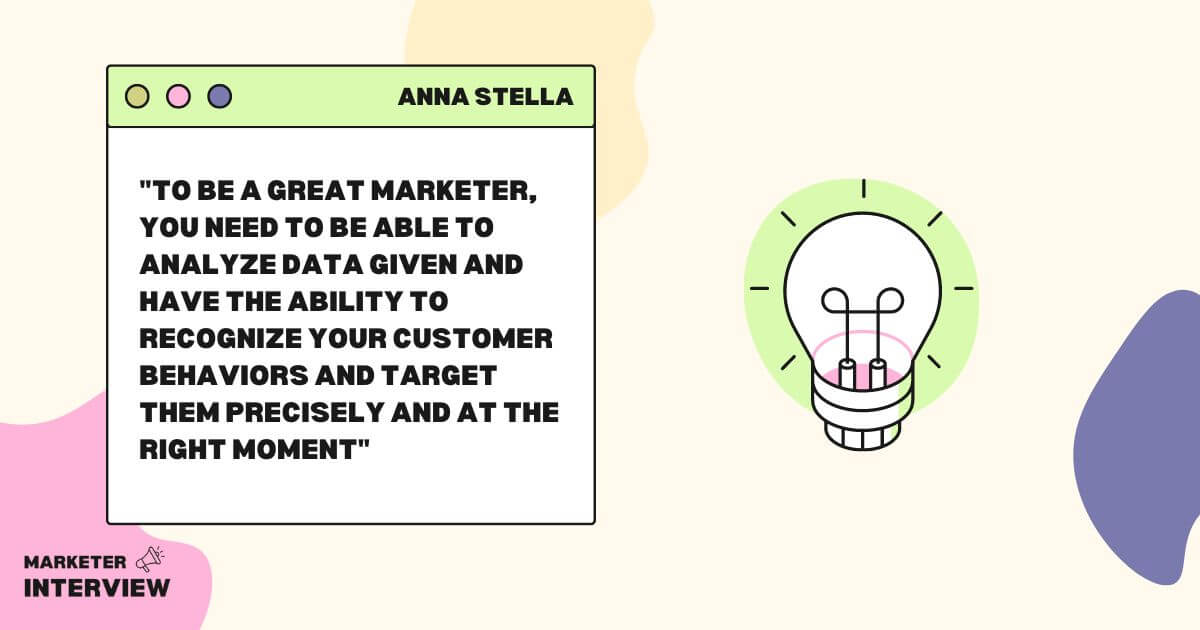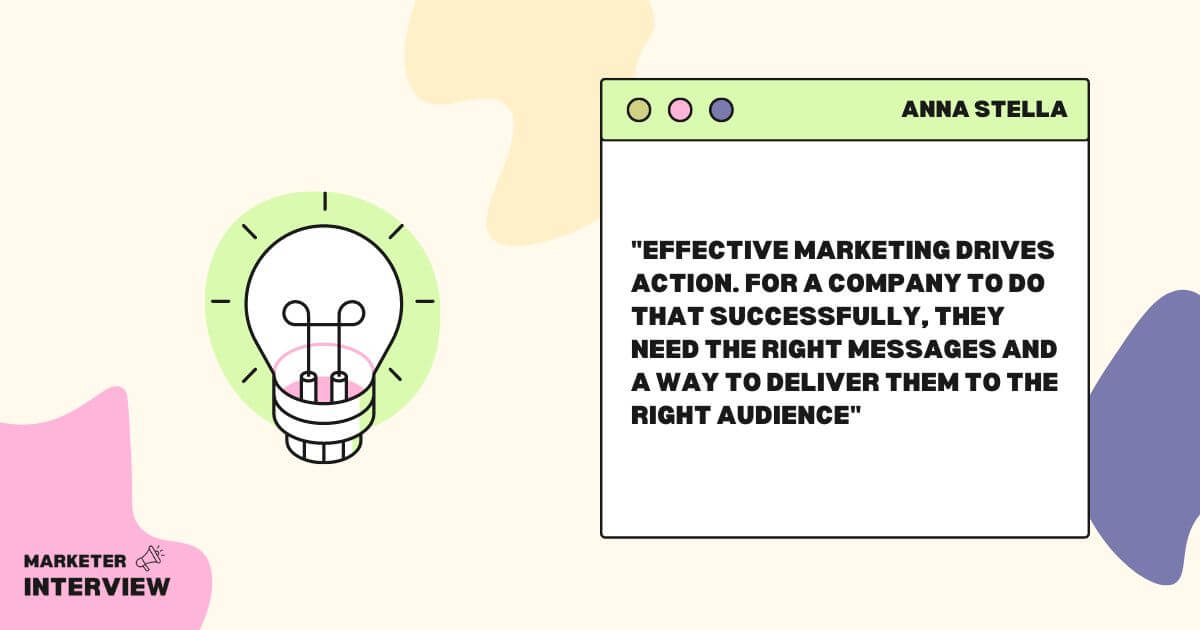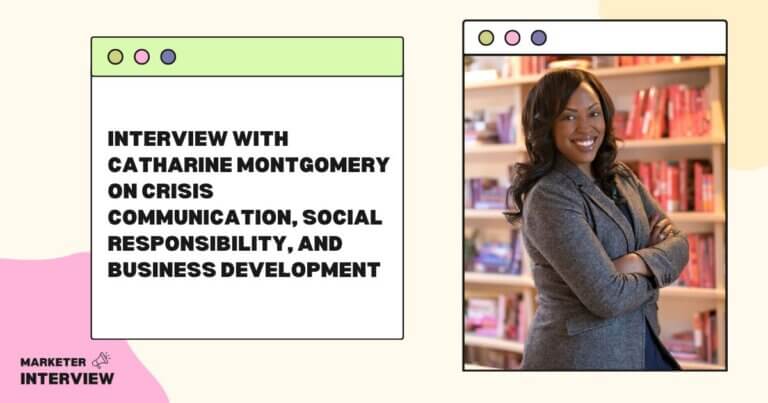Interview with Anna Stella: Navigate the Complexities of Modern Marketing
Anna Stella is a seasoned marketing expert and founder at BBSA Marketing Agency, with over two decades of experience in the industry.
In this interview, Anna shares her insights on the challenges of growing a business, the essential skills for success in marketing, current industry trends, and how to develop a marketing strategy for a new client.
She also discusses how to measure the success of a marketing campaign and the common mistakes that companies make, and how to avoid them.
With her wealth of knowledge and experience, Anna provides valuable advice for marketers navigating the complexities of the modern marketing landscape.
Let’s dive in!
Contents
- 1 How did you get started in the field of marketing?
- 2 What are some key challenges you’ve faced in growing your business? How have you overcome them?
- 3 What do you think are the most critical skills that a marketer needs to have to be successful?
- 4 What are some of the most important trends currently shaping the marketing industry?
- 5 How do you go about developing a marketing strategy for a new client?
- 6 How do you measure the success of a marketing campaign?
- 7 What are some of the biggest mistakes companies have made regarding their marketing efforts?
- 8 What essential tools and software programs do you use in your marketing work?
- 9 What advice would you give to someone just starting out in marketing?
How did you get started in the field of marketing?
My path has always led to marketing. From a young age, I was mesmerized by clever marketing and beautiful commercials more than any TV program for kids or children’s activities.
To this day, my love for marketing and advertising has never left me, and over the years, I have managed to turn that passion into the successful career I have today.
What are some key challenges you’ve faced in growing your business? How have you overcome them?
For me, complacency was one of the key challenges during that time.
Marketing is a fast-changing industry, and it’s hard to keep up with the many technological advancements. While we all know that change is the only constant in business and life, planning is another story.
It is very unwise to assume that you will succeed based solely on past achievements. You need to regularly update and revisit your business plan to remind you of the changes in marketing conditions and the importance of responding to them.
Another issue was organizing the growing team and infrastructure.
While the company’s size increases and the expertise expands to new marketing verticals with new hires, the organization infrastructure must be different even though the culture of the business is the same as before.
The challenges are especially true if you have offices in multiple geographies and continents. To save money and time, you must match each employee with their best jobs and often revise it for efficiency.
What do you think are the most critical skills that a marketer needs to have to be successful?
For a marketer to succeed, it is essential to embrace technology and data.
Although tech may feel like the pace will continue to grow rapidly as marketers, we must strive to keep up with the changes.
Furthermore, our job is increasingly tech and data-driven. To be a great marketer, you need to be able to analyze data given and have the ability to recognize your customer behaviors and target them precisely and at the right moment.
Another critical skill to cultivate is customer obsession. Many industry leaders consider this holistic concept as the future of marketing and customer experience as it ranges from constant market research to data on customer feedback and satisfaction to user experience and privacy concerns.
Lastly, as a good marketer, you must have a solid understanding of marketing. Again, as an academic in this field, this is a strong foundation for excellent marketing work.
You need to study marketing, and its evolution, as making an effort to connect the dots is not always enough, especially if you don’t understand what marketing is and how it works.

What are some of the most important trends currently shaping the marketing industry?
Over the years, marketing has become increasingly complicated, making it difficult for businesses, especially small companies, to hire and keep talent in-house.
More and more companies are looking to outsource marketing and AI to help generate and achieve a targeted user experience and have more personalized content.
Additionally, many companies are now investing more in developing websites with complex interfaces that are user-friendly.
Another currently massive trend is the use of social media marketing by small businesses and the need to ensure the portrayal of consistent branding across different channels.
How do you go about developing a marketing strategy for a new client?
Marketing is an essential part of business for companies. Building a successful enterprise requires strategic focus and a solid understanding of what your clients need and how they shop around and ultimately spend their money.
While creating a marketing strategy and a plan is a process, I don’t recommend following one particular template but instead using several vital steps to help with the development.
For BBSA, I first like to kick off things with a series of client meetings. Then, once we’ve started working with them, we spend considerable time reviewing previous marketing history, discussing their business, goals, and needs, and afterward, working on their branding.
The next step for us is to do market research.
At this stage, we use all the information provided to carry out extensive market research to identify the status of the markets, trends, the client’s strengths and weaknesses, and how they stand up against the competition in their market or the market they wish to enter.
We also look closely at the competition and reverse-engineer their marketing activities. One key thing at this phase is to stay impartial and take and take the data as it is.
Once the research is done, we use all the information gathered to create a marketing strategy. Using best practices for the client’s industry, we’ll tailor everything to their business objectives, budgets, internal marketing structure, and specific needs.
How do you measure the success of a marketing campaign?
There are hundreds of metrics a marketer can use to analyze marketing performance. Although there are no set standards, metrics are related to the marketing objectives we are trying to achieve.
When it comes to marketing, it may drive more than sales. However, it is the sales numbers that determine its success.
Often marketing leaders use metrics and other historical benchmarks to associate the correct data and results with various campaigns to demonstrate the influence and ROI of marketing or its absence.
What are some of the biggest mistakes companies have made regarding their marketing efforts?
Over the years, I have seen a lot of marketing mistakes made by companies, some bigger than others, and not defining your customer from the beginning will definitely cost you in the future.
Effective marketing drives action. For a company to do that successfully, they need the right messages and a way to deliver them to the right audience. A winning marketing strategy is based on defining the customers and narrowing down on what they care about, followed by other things later.

Another thing I have seen from many companies is doing too much experimentation without proper research. Unfortunately, for most, this approach is very costly with little to no return and often leads to a company constantly changing tactics and strategies.
A better option would be to invest time and resources in researching (and positioning) who you are as a company within your market. Then, once you are clear about who you are, use that information to create a competing story around that and stick with it since people are often consistent and prefer to build loyalty and trust with what is familiar to them.
Similarly, another mistake many companies make is moving ahead with no proof that the market they are in is a good fit for them.
Most companies, especially in their early stages, need help finding their market fit. A pilot program or early purchases are often enough to determine the fit once the product or service reaches the masses.
Startups and small companies should accurately test their market messaging softly and make changes as they learn their market.
Another thing that companies need to understand is that they need to be the ones telling their own stories.
Unfortunately, many entrepreneurs try to push their company stories to other people with the hope that they distribute them. Such a strategy rarely works. A better option is to talk about yourself through your official channels until others start telling and sharing your story for you without asking.
Lastly, I have seen many entrepreneurs give up on their dream after just one failed attempt.
Being disappointed and discouraged is expected when you fail to achieve the results you were hoping for. However, if you believe in what you are going and the solutions you are providing, instead of letting go, take a few steps back to assess the situation and develop a solid differentiator to what you are offering.
What essential tools and software programs do you use in your marketing work?
Many tools and software are in the market, like Hubspot, Infusionsoft, Zoho, Pardot, Marketo, Salesforce, Constant Contact, MailJet, Slack, ClickUp, and Trello.
And in the 10 years, we have been in business, we have worked with over 2,100 clients and have had to try working with almost all software in the market since each client has their own set of requirements.
Working with different clients has taught me that it is the marketer’s job to know all the tools and software in the market and consistently get familiar with how other companies work, as it is crucial to our learning skills.
What advice would you give to someone just starting out in marketing?
I would tell them to fall madly and deeply in love with marketing. Because if they don’t have a genuine interest and are just in it for the money, they will struggle to understand and keep up with its many evolutions.






